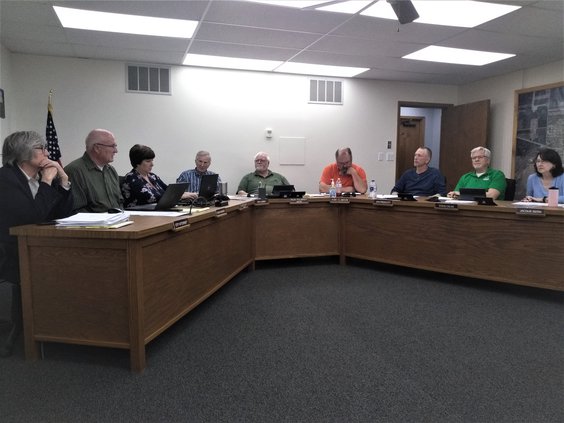ELLINWOOD — The Ellinwood City council covered a five-item agenda at a special meeting Monday. Among the items approved was a 1 cent per kilowatt hour price increase to residents’ electric bills.
The increase is in response to the February energy crisis that impacted municipalities across Kansas. The increase will be in effect for the next two years or until the city is able to pay off its bill to the Kansas Power Pool (KPP). The price increase will go into effect on Thursday, April 1.
City Administrator Chris Komarek, who serves on the KPP Board of Directors, said the one penny increase is a surcharge by KPP in an effort to help reduce the city’s original bill of $470,175. “By KPP billing us a 1 cent surcharge it turns out our bill will be cut down to $128,000,” said Komarek. “And so we would pass that surcharge on to the customers.”
To put that in perspective, if a customer uses 2,000 kilowatts of electricity, they would see an increase of $20 on the monthly bill, 1,000 kilowatts would see a $10 increase and 800 kilowatt usage would translate to an $8 monthly increase. “It’s always going to be a variable amount but we believe it’s the fairest way to recover the cost involved with this recent weather event,” said Komarek.
He said that with additional charges to the city bill from KPP it’s important that the city exercise diligence in paying the bill off. “I plan on sending out a newsletter to electric customers breaking down why their electric bill will be higher than normal,” said Komarek. “With the long, hard freeze last month and the stress it put on our plant, I think most folks will understand that as to why their bill has gone up.”
Ellinwood became a member of the Kansas Power Pool in 2007. The city has its own power and sewage plants, several water wells, recycling trailer and compost area.
Property condemned
In other business, following a public hearing and several months of discussion, the council approved the condemnation of property at 214 West 1st St. A house on the property was deemed unsafe and dilapidated.
“We first sent a letter to the property owner in July of 2018 notifying him of the situation,” said Police Chief Chance Bailey. “The structure on the property continues to deteriorate to a point that it is unsafe.” Among the areas of concern in the structure are fire hazards as a result of outdated and exposed wiring, a large tear in the kitchen ceiling allowing rain water to enter the house and an uncovered breaker box. “Our biggest concern is the eventual collapse of the roof,” said Komarek. “It could be just a matter of time before the whole thing crashes down.”
Eugene Merica, who owns the property, told the council during the public hearing that he lacks the necessary funds to address structural issues. “I’ve had contractors come out and look and provide estimates but I just could not afford their prices,” Merica said. “I’m in total agreement with everyone that the house is unsafe and needs to be torn down but I’m just worried about the situation with the empty property after the house is gone.”
Komarek told Merica if the council approved condemnation of the property, he would have 15 to 30 days to demolish the house himself. “If that doesn’t happen, then the city would solicit bids and then hire a contractor to demolish the house,” said Komarek. He added that if the city takes over demolition, then Merica will receive the bill. If he is unable to pay the demolition bill then it will ultimately end up on the delinquent property tax roll. Following council approval of condemnation of the structure, Merica was given an April 23 deadline to demolish the house.
In other business, the council approved amendments to the Humane Society contract and approved an agreement of acquisition of property for the city’s flood control project.





